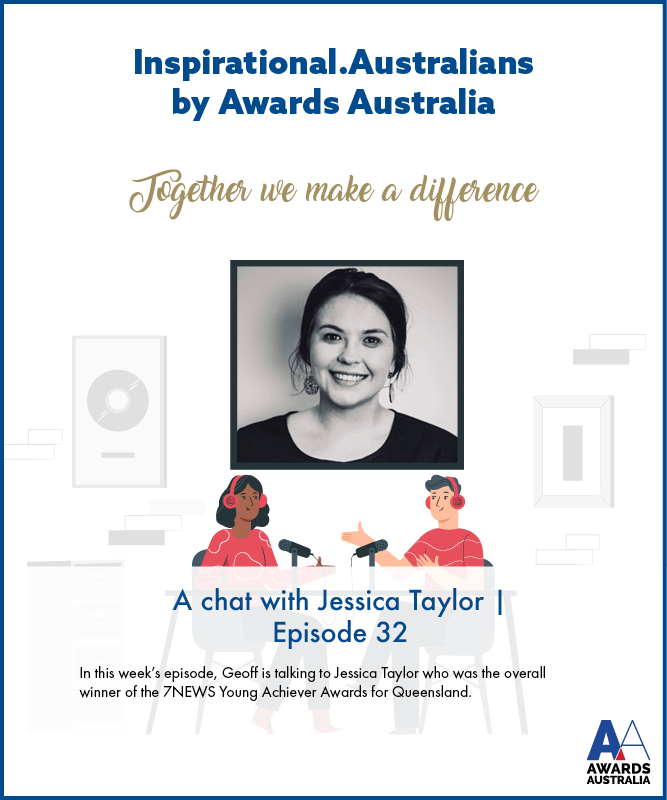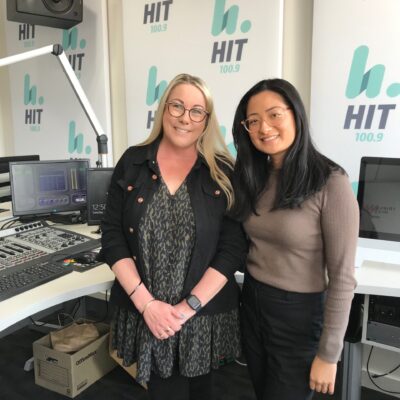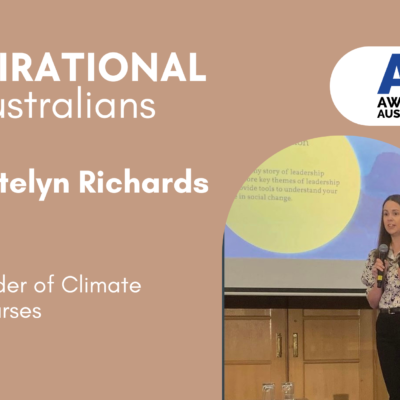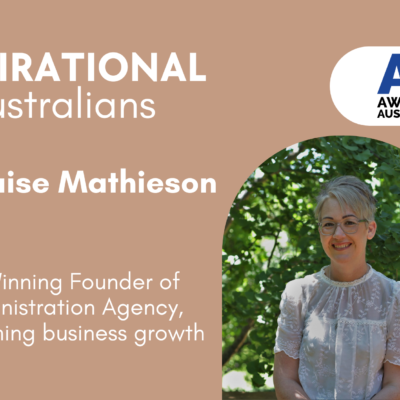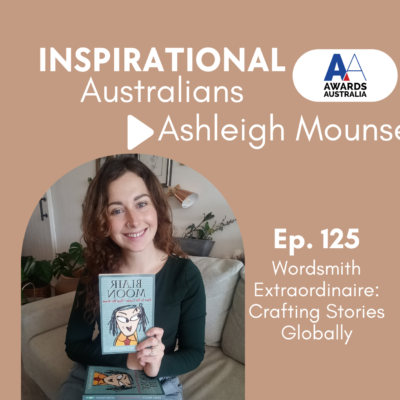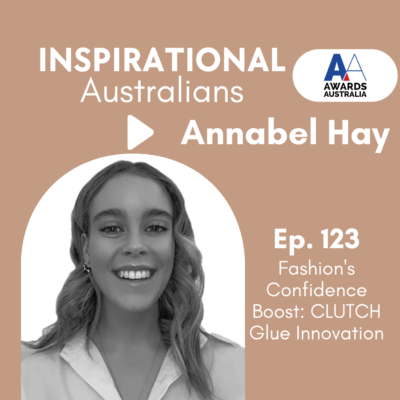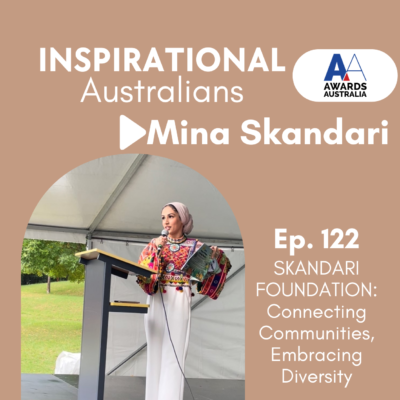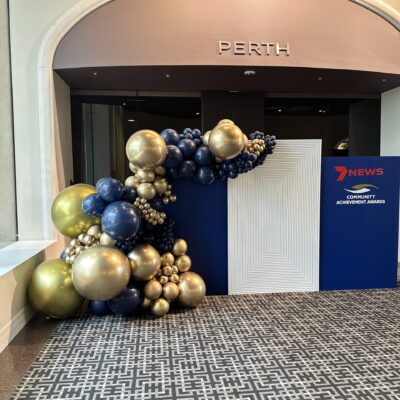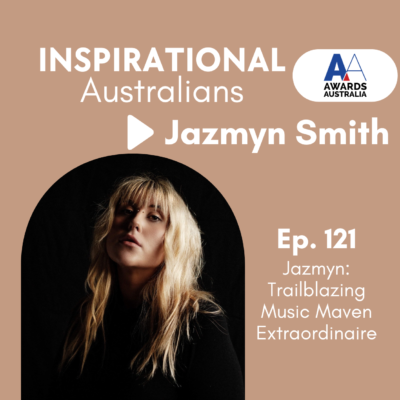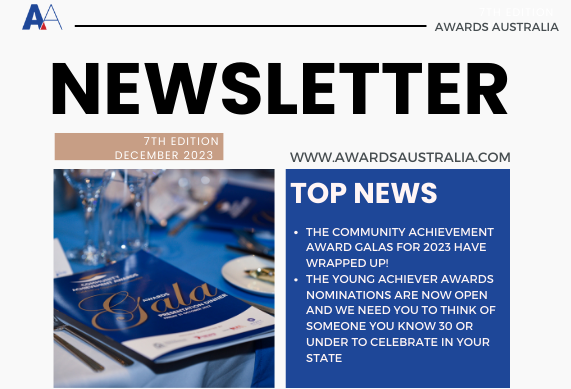In this week’s episode, Geoff is talking to Jessica Taylor who was the overall winner of the 7NEWS Young Achiever Awards for Queensland.
Jessica Taylor is passionate about empowering women. Jessica is the President and Director of QENDO, a not-for-profit that supports women and girls affected with endometriosis, adenomyosis, PCOS or infertility. She picked up the 30-year-old charity to connect with the new generation and grew the team from three to 59 volunteers. Jessica has improved operations by rebranding the organisation, securing sustainable income and establishing key relationships with government, workplaces, schools and rural communities. She helped develop a National Action Plan for Endometriosis, a Queensland Government-funded app, and successful school programs. Jessica was the Gold Winner at the Aus Mumpreneur Awards’ Making a Difference Award.
In this episode:
- We hear how passionate Jessica is in relaying her message that it’s not OK to live with pain that prevents you from your activities.
- Jessica has two graphics in her office to focus her, and they say:
- Remember why you started
- Prove them wrong
Links
Connect with Jessica on Instagram
Connect with Qendo on Instagram
Visit the Australian Pain Management Association website
Want to know how to Rate and Review a podcast, see this article
Follow us on our Inspirational.Australians Instagram Page
Want to nominate someone? (It can take as little as 2 minutes to recognise someone making a difference)
Like some more information on Corporate Partnership?
Transcript
Annette (00:05):
Welcome to the inspirational Australians podcast, where we chat to people, making a difference in their communities and in the lives of others. And here is your host for today, Geoff Griffin.
Geoff (00:21):
Welcome to the inspirational Australians podcast stories of inspiring achievements and community contribution. Every week we will celebrate an award program category winner or finalist. We hope you’ll be inspired and encouraged to know that Australia is in good hands. Together with our corporate partners and not for profit partners, Awards Australia showcases ordinary people from right across Australia doing extraordinary things. If you enjoy hearing the stories about inspirational Australians, please subscribe, rate us, and review us. We’d really appreciate it. My guest today is an outstanding young leader and community entrepreneur. Jessica Taylor is president and director of Qendo, a not for profit that supports women and girls affected with endometriosis, adenomyosis, PCOS or infertility. Jess is also the CEO of Australian Pain Management Association and founder of several programs and services right across the world. It’s such an honor to have you on the podcast, Jess. Thanks so much for joining us and congratulations for all you do.
Jessica (01:39):
Thanks so much, Geoff. It’s really great to be here today.
Geoff (01:42):
You really are inspiring. You have such a passion to make a difference across a broad range of issues in conditions, supporting those with infertility, endometriosis and similar disorders, what actually ignited your desire to make a difference for young women and these conditions.
Jessica (02:03):
So I have my own story with endometriosis and adenomyosis, and that coupled with, uh, coming from a family who are so involved in the community, it was really a part of my upbringing to give back and be here to help others. Um, and so through my own experiences with endometriosis, adenomyosis and working through the system, private and public, uh, not knowing at such a young age, what was going on and it being deemed as normal when it really wasn’t normal. That really ignited my, my, my query as to what’s really going on. And then my passion, uh, to no, this shouldn’t be happening to the hundreds of thousands of people across Australia and across the world. And, um, the, the two together really got me hungry to make change.
Geoff (02:54):
Really must be difficult in your own body to understand what’s going, is this normal for everybody else? Or it’s just me, that’s experienced this and why am I going through all this pain discomfort and the associated issues involved with the conditions? Can you explain a little bit more about endometriosis and adenomyosis, what impact they specifically might have on young women and how we should, I guess, understand and appreciate problems?
Jessica (03:25):
Sure. So endometriosis is where the endometrial like tissue. So we have an endometrial tissue that lines the uterus and very similar tissue. It’s not exactly the same, very similar tissue moves throughout the body throughout a menstrual cycle. And it’s really not sure as to why and how that happens yet. There are many wonderful reasons, which is who are being dedicating their life for the last 30 years to work on. What’s really going on there. Um, but that’s really what’s happening in the body. And when, uh, when someone or person within endometriosis or a cycle goes throughout their menstrual cycle, those stills set up camp, uh, wherever they land and then continue to grow and grow. Now for generations. This has been a painful periods, has been deemed as normal and only, um, in the last couple of years, have we really been pushing to better understand what is normal and what is not normal? So, I mean, in my own story, I remember from a very young age thinking, Oh gosh, am I a hypochondriac? Is this all in my head? Why surely this doesn’t have to be so painful. And, and when I spoke to my mum, God bless her. She said to me, look, it’s normal. It’s part of being female. Uh, you know, you’d later we found out that she thinks has had endometriosis and that was her normal. So there’s a generational misunderstanding around cycles around women’s health. And so we’ve been really nailing it down into the younger generations around what is normal and what’s not normal. So if people have pain, that is, uh, w where they can’t go to social activities to school, uh, where it’s stopping them, do their normal life, whatever they want to do that is not normal. If they’re having pain during this cycle, during ovulation, menstruation, and so forth, if someone cannot handle or manage the pain with simple ibuprofen, Panadol, and Nurofen and a heat pack, well, that’s not normal. So there’s some really easy benchmarks for people to, uh, think about and checking on their body is what I’m going through each month or each day often normal, or is it not, we have a, uh, another condition like you mentioned, adenomyosis, which is the distant cousin to your endometriosis. And even more misdiagnosed in this understood it’s, it’s considered in the medical industry, um, that people young people cannot, uh, have adeno, however, this is totally totally incorrect. There are loads of young, young girls, uh, with adenomyosis. And this often presents as very heavy bleeding, um, quite significant, um, discharge, clotting, um, so it, and it can be really painful. So there’s so much to this, and it’s all about checking in and, uh, women really, or people with these conditions, because we have communities who don’t identify as female, and it’s about people checking in with their bodies around and understanding what’s normal. Does this sit well with me, understanding what do people value, uh, and they’re in their health team and then working it out from there.
Geoff (06:41):
Yeah, I understand that the menstrual cycle in itself is, can be painful enough without young women, young women going through and girls going through this. So I know that you’ve become a very important part of Qendo, which is making such a difference in this area. Can you tell us a little bit about the impact that you’ve made? I know you started with three volunteers, for example, you now have so many more, how many do you have and, and what difference have you made and things that you’d done there?
Jessica (07:17):
Yeah, sure. You know, I’d like to take a little minute to recognize the women before me who were championing and pushing this cause, Qendo has been going for over 30 years now. And so, you know, that’s well before my time. And, um, but they have just really laid the foundation. And when I was diagnosed with endometriosis, um, I call Qendo after coming, you know, researching and thinking, what else out there, what else is out there? And I spoke to the president at the time and her passion and her commitment to other people going through this type of pain and process to actually find answers is what really got me on this journey. And I remember saying to her, uh, very newly being diagnosed. I remember saying to her, just, yeah, let me, let me help you. I want to be on board with this. And so, um, you know, a like many, uh, organizational change, there’s a changing of the guards and a new direction. And, uh, it was, it was time to ignite some new, fresh energy into this and, and just carrying through, um, the whole service to other people and helping and being so willing to use your own experience, to support others. And throughout my time, I’ve really loved this story, the starfish story, where some girl was walking along the beach and she was picking up a starfish one by one, there were hundreds of them washed up, and she was picking them out one by one, throwing them back into the ocean. And someone came out behind her, tapped her on the shoulder and said, what are you doing? You couldn’t possibly be saving all the save, all the stuff fish. She turned around, picked up one more starfish, threw it back into the ocean and said, well, I saved that one. And so, we’ve created this culture in Qendo, if you can create and support one person each day, you have done an incredible job because it just takes that one to really change their life. So, yeah, we’ve grown this organization where we’ve got over a hundred volunteers and they are really championing that attitude of helping others through what’s going on for them and where they are the most incredible people that, that you come across and endometriosis touch so many diverse lives, whether they be, uh, entrepreneurs, whether they be teachers, they might be a partner of a garbage man. Uh, you know, endometriosis does not discriminate. And it’s about talking about this, supporting others. And we’ve been able to grow this incredible organization to help every people every single day. And that just totally fills my heart.
Geoff (10:03):
Yeah. Brilliant. That’s a, it’s a wonderful story. And you are, I know, so very passionate about all that you do, and the difference that you’re making in Qendo, I know is extraordinary. So thank you for that. And for all that, all of your volunteers do. And of course it is about understanding. It’s about awareness. It’s about education and people can come to Qendo to find out more. And of course, maybe get direction of who to go and see whether it’s your local GP or who to go and say, as to how you can manage, uh, the condition, which is, it must be just dreadful. So if there are any young women girls listening, please contact Qendo for more information. If you’re not sure what’s going on in your body, then, um, find out more. We should never put up with pain or discomfort or whatever we feel is not normal. How did COVID affect Qendo? It must have had a bit of an impact.
Jessica (11:09):
So we had to pivot quite quickly, like many, many, many other businesses and organizations we would catch up across Australia face to face every month. And so we needed to change that to online sessions and online connections, which can be really tricky because it’s the person sitting next to you. If you need to have a cry, it’s the, uh, it’s that community around you that can really help you through the day and having to turn that online and on virtual, um, was quite tricky for other people. We saw a significant increase in people who needed some additional mental health support. We saw, uh, surgeries, people who were looking to have for possible diagnosis of endometriosis that canceled, IVF canceled. So it takes such a journey, such a, such a journey and such pathways to get to the diagnosis, to get to the surgery, to get to the management into the psychologist. Oh, and then to have that totally, that, you know, those taps turned off almost overnight, was absolutely heartbreaking for hundreds of thousands of women. And so we had to step up, we had to be there for others when a lot of our team were going through that themselves, but it really brought people together because we were in the trenches together. We really can understand what’s going on. And we have such a diverse group of people that someone might come to us with a hysterectomy question. They might come to us with a freezing eggs question and IVF question, and we have this amazing network of people who can call them or talk to them and say, okay, Hey, I get you. I’m here for you. Let’s talk through it. And so it was, it was tricky, like so many other organizations, our sponsorship drops, our face-to-face meetings dropped, but it also ignited this deeper, deeper connection and deeper, um, deeper call to service to help other people.
Geoff (13:10):
And having that service available to people in need and to time that was so critical to everybody would have been just wonderful and essential. So certainly, you know, I guess that, uh, counseling that being there to people would have been instrumental in helping them get through that having surgeries. And it sort of happened across the world, isn’t it surgery’s canceled and just really impacted people’s lives. So significantly, probably far more than we could ever really understand or appreciate. So I’m sure you had just a, a sense of that far more than us.
Jessica (13:48):
The reason that people were going in for surgery is because that is really the way to be diagnosed with endometriosis. So you cannot be diagnosed through a blood test or scan or so forth. You do need to go in and have a laparoscopy to, with a specialist who is under, who understands and knows endometriosis. So, uh, and then you need to have the gold standard is to have the disease excised, that means cut. Some gynecologists ablate or, or burn the disease away, which is, um, which is pointless really, because it just grows back. So it’s, it really was, um, it really was this lifeline that people had turned off and, and we needed to be there to pick it up. It was, it was quite an intense year, and we’re still seeing a flow on effect from that now the wait-lists have blown out. Um, and it comes back to really getting that multidisciplinary team around the people. Um, and you know, a lot of the time people just need a person, like a lot, like Grey’s anatomy with Meredith, you just need a person and a in your corner and to hold that space for you. So, we were able to be that, that space for so many people and continue to be so.
Geoff (15:03):
Yeah. Okay. On you and to your team. So invaluable, well done. We’re heading in a slightly different direction just for the moment. Last year, you won the, I Fly Online Achievement Award and you also went on to win, of course, the 2020 Young Achiever of the Year and 7News Young Achiever Awards for Queensland, what an extraordinary, um, validation for you, but it was all about your extraordinary contributions to the community. What was your initial reaction to when you were originally nominated?
Jessica (15:37):
Oh, I was just so pleased to have endometriosis and the conditions that I support spoken about and that awareness at that level, you know, it’s, it was, it wasn’t just me. It was this, you know, one in 10 people across Australia who, who could then see endometriosis talked about and shared about at that level, which is awareness really, and it’s education. And if people aren’t sure what endometriosis stands for or what it is, they could, they had that opportunity to learn. So to be, to be nominated was just, uh, you know, it was so lovely, but again, it was just so exciting to have, have it at that level.
Geoff (16:15):
Well, it must’ve been an incredible thrill to be acknowledged and validated by winning your award. And of course, winning the overall award. What has it done for you and how has it benefited yourself and of course, Qendo and all those around you?
Jessica (16:35):
So I won the Align Achievement Award for my work to develop the app. So, it’s the Qendo app, and it’s a free app funded by the Queensland government and it was developed and co-designed by with over 3000 people in the community. So we, we did not, I did not make, I think I might’ve made one decision without it running past everyone, but everything, every single thing in that app, every component function, language, uh, design graphic, it was all cards on by this incredible community. So to see that, um, come to life really, but then have it validated or recognized at that level really spoke to me in the powers of bringing in the community to make decision and having this cohort and this funnel of people who are educated, uh, allowed me to make informed decisions. And, and I’d love to see that really progressed and really, um, become the norm in so many different projects and policies and getting really in touch with the grassroots of the community. So, and from that, it has totally changed. I mean, I had so many messages and opportunities from people who recognized me because they had seen my face on the every morning, which was a bit of a shock to begin with, but I’d go into networking meetings or I’d go into new partnership meetings. And people would already know me, which was, which was really lovely because, uh, the conversation was so different. They, they knew who I was, they knew what I stood for, and they were so keen to back up what we were trying to do. So that was, that was massive, uh, for a condition that is still not really known about and an organization that despite being run for 30 plus years, still fairly, um, fairly shadowed in the, in demographic, in the market to have people to have going to go into meetings and have people know who we are was just so exciting because it’s what we’ve been working towards for years and years. So thanks to these awards that were able to really heighten that awareness.
Geoff (18:37):
Yeah. It’s just one step in a process, isn’t it? And I guess, uh, you’d encourage anybody to nominate someone they know, because it is all about raising awareness, telling the stories. That’s, what it was all about is telling the stories of people like yourself and what they do and being nominated is not about the person so much as what they do and sharing their stories so that others can learn and find out the benefits of what people are doing and how they might get involved support or benefit from the services.
Jessica (19:15):
Geoff, this, the whole process is really putting on putting exposed to what young people are doing. And we are the next generation. Uh, we are that we are the future. And through going through the processes, now that it was my second year going through just watching and learning and hearing what young people are doing. I’m talking 10, 11. I think some of them were, uh, last year, what they had been able to do where age is no barrier was so inspiring and, you know, I’m nearly 30 and it was even inspiring, um, to watch those young people and also some hope for what our future brings, because we have this rocking generation who are about to go through uni and make some change in the world. So to be a part of that was so humbling, but then to see this amazing network of young people who are ready to rock, ready to roll in and make some change that are already making change. Yeah. That was very cool. Really cool to see.
Geoff (20:17):
And it was terrific that we were able to still hold the event, even though it was online and across the country. Normally of course, we would have tended to sold out gala presentation dinner at our beautiful friends at the Royal on the Park. But last year, of course, we had to change up not being able to hold those events. And we’re really thankful to 7News. And in particular, uh, Max Fletcher and Katrina Blowers for again, hosting our awards in the 7News studios, and people probably wouldn’t understand or know that they had a team of five other people there managing the production. So it was big deal for them. And it cost to them to actually put that together for us, but they wouldn’t have had it any other way. And, uh, and this is not meant to be an ad, but 7News really up conscious. Um, and this is unsolicited of course, but promoting the story, the good stories as well. And this is one way they can do that. Of course, I, uh, I hope the online experience, and it sounds like it was still very special for you and the other finalists.
Jessica (21:27):
I think, uh, I was, I was nominated in 2018 and a finalist in 2008, sorry, 2019 awards. And I met Katrina, uh, then, and she was just such, and she still is such a humbling, lovely person who just wants to know and hear about the great things that are going on. So then to see her again in 2020 was even was lovely again. Look, you know, it’s, it’s interesting, they’re totally different situations being in a room of 200 plus people rather than in your home, um, or mine. But I actually really enjoyed it because my family were there and we invited people COVID restrictions, you know, guidelines, following guidelines, of course, but we invited family and friends to be around me who wouldn’t have come if we were in person. And so that was really special for them, you know, elderly, Gran, uh, grandparents or, or, um, you know, young people who, who wouldn’t have come to a gala dinner, they were still able to experience it. So we did the best we could with, with what we really had. And it was wonderful, you know, it would have been great to get up and, um, you know, in front of that many people, but, um, you know, it, it, you do what you can and it, it was really lovely, um, regardless.
Geoff (22:38):
Yeah, well, you didn’t quite get the 400 people in the, um, in the ballroom, but you had quite a little party going on socially restricted. I could see, but you had quite a little party going on with your, um, with a band of people that are obviously an important part of what you do at Qendo and family and friends. So that was pretty awesome. And, uh, yeah, hats that the various hats, I think there were three, at least different hats that you wore. What was the story with the hats?
Jessica (23:08):
Yeah, sure. So we had a Mexican party and we all wore sombrero hats. Um, and just to be a bit more festive and the idea was every time I would come up online, cause I was nominated for a few awards, I was wearing a different hat and that signifies the many hats that I wear. As you said earlier in the introduction, Jeff, I wear many, many hats in the community, um, across so many different networks. And so, uh, as I came up each time, it was to signify me wearing another hat like I do every single day.
Geoff (23:39):
You certainly look the part. Uh, they were very, uh, very interesting and colorful Mexican hats somewhat. And for those that didn’t see the online event, you can sort of see that by getting onto the Queensland Young Achiever Facebook page, you can actually watch the event if, uh, if anybody listening is interested. Now, getting back to the work you do. I know funding, as you alluded to just a little while ago, funding for non-profits is always a challenge. And COVID compounded that. How have you addressed that issue?
Jessica (24:13):
Uh, I think we’re reassessing what we do and it was a good idea to do a new strategic plan and, and really assess where we are, where we’re heading. Um, but I, I mean, that’s still ongoing. We were not really quite sure of the true impacts of COVID just yet. Uh, but we’ve, we really funneled a narrative and what we do and, and look at what works for people, what people are wanting. We, we kicked off a range of pajamas last year to diversify our funding and our income. So we’re less reliant on government and, um, enabled to be self-sufficient, um, that’s the goal anyway. Um, but you know, we, again, co-design and work with the community, we often ask people, what do they need, what do they want to see? And then create some products to better support that. So, we uh, developed a bedding range for people who are, um, you know, conscious or sleeping on towels a lot of the time, people with endo and adeno often sleep on towels and in case they are going to have an accident. Uh, so we created a beautiful bedding range with some indigenous women’s symbols to signify that, um, you know, it, it’s okay to do this and you can put it on your bed if you’ve got a husband or a partner or a girlfriend. Uh, so it doesn’t look like a tail. Um, and then also pajamas, we developed some pajamas with organic bamboo, um, to people feel for people to feel comfy if they’re going to the hospital, if they want to be in their pajamas all day. So we really needed to pivot like lots of people and, and get creative. Um, so we have merchandise, we have events, we have a long lunch coming up in March with, we’ve got nearly 200 people coming to that, which will just be a total blast. So yeah, it’s, it’s tricky. We’re, we’re still working that out. We’re still finding what else, what else needs to, um, to happen. But I think a lot of organizations are like that.
Geoff (26:06):
Yeah, absolutely. We’re no different and sponsorships everywhere, I think have been cut drastically, including for us. And if anybody would like to find out more about partnership opportunities, give me a call or an email at geoff@awardsaustralia.com, or if you want to know more about, or you’d like to support Qendo, give Jessica, um, we’ll get onto Qendo. Uh, so the website there, and I’m sure Jess, but love to have a little chat to you as well. So a little plug there for both of us, I think. Now, you also helped develop the next national action plan for endometriosis. Um, what was that about it and what outcomes have you come to so far?
Jessica (26:50):
So this national action plan was supported by the federal government, but it took a lot of work to actually get to that stage. So we, uh, formed a national, uh, group of people, ACE – Australian Coalition for Endometriosis, which works with all of the key endometriosis groups in Australia. So, collectively, which is just such the takeaway community and collectively, we were able to reach out to our next networks, reach out to the politicians in each of our areas and let them know about what was going on with these, you know, one in 10 people in Australia. So, it was this collective effort to raise you in as, and educate our politicians and get the women who have had years of, of trauma and years of heartache to tell their story. So we did that in an organized way and in a strategic way. And we were able to, uh, make, make enough noise that the federal health heard us. So, we then came together, um, after many, many months and, and some years too, in, in working all out, all of this, we came together with the federal health to develop a national action plan. And so this action plan was, uh, consistent of consumer groups. So Qendo and other endometriosis groups in Australia, pediatricians, gynecologists, uh, researchers, uh, GP’s, all of the people who help people with endometriosis. We came together, we sat in a room and we pretty much said, what are the issues? What are the barriers? What do we want to achieve? And you know what, Geoff, it was amazing to see such a collective, uh, idea. So everyone supported each other. We had really great discussions. Some of them, you know, where, um, were very interesting discussions, but they needed to be had. And we, uh, we worked together to create the faction plan, which has several outcomes and several, um, several plans to help the people with endometriosis in Australia. Now that’s a five-year plan we’re almost finished. So we need to go back and push Greg Hunt for some more money to achieve some of them. But a part of that is the app that we developed. So the whole idea of that action plan is to really create a blueprint or a pathway to help people with endometriosis. So endometriosis clinics, schools programs, which we piloted in Queensland last year or the year before the years of kind of running into each other now. Um, and, and the app, and there are many more initiatives that have been funded. So, you know, the federal health really got behind endometriosis and they did do this strategic action planning for other conditions. And I have been blown away with the progress for endometriosis, and I really truly put it down to community because we did it as a collective. We came together and we all, um, we all did it together. So it just speaks, speaks so many words around networking, working with others the way it really should be.
Geoff (29:54):
Yeah. I think the key is working together as an, a people work together, whether it be within the organization or as a more of a collective, a broader collective is so important and people forgetting their little personal conflict or, or the jealousies or their, whatever it is. But other organizations working together makes such a difference. What do they say? A team of champions? Uh, I can’t remember the same, but it’s about people working together and not individual champions. So I think you’re quite right. And that was a great approach. How is the Qnedo app going if you’re getting some good uptake on it?
Jessica (30:36):
Yeah, I mean, it was, we’re blown away and we get messages every day thing. I love this app. This is incredible. So, you know, we, we spent a year building it and we really engage the community along that, along that path, um, to develop and design. And then on day one, we had just over 2,000 downloads on the first day. So I’m told in, app world, that’s very, very good. Um, we now have over 300 out of data entry, so it’s a gold, gold pot of gold for information. And I’m hoping that we could use that data to make informed decisions about policy changes and about the future because women are, and people are entering what’s going on for them. Obviously, everything is completely confidential, um, unidentifiable. But if those people that are entering data in the future would give consent to then, uh, share that on an identified data with the government to then make changes. I think that’s what would be really, um, really beneficial. I mean, we have people who have been presenting to the emergency department for three years and they’ve been pinned as a drug seeker. Um, but since working with the app and tracking the app, they’re actually, uh, they actually went to the, to the emergency department, showed them what was going on because they had been tracking everything. And the emergency physician said to them, you need a referral to a gynecologist. So really almost by using the app, they were able to actually seek help that they have been trying to for three years, but were pinned as a drug seeker. So these are the types of barriers that people are facing when they just are in so much pain they’re facing up to emergency because they don’t know what else to do. And then ha being faced or being labeled as that is really disheartening. And it doesn’t validate what’s going on for them. And they’re the people in the community that we hear from, and that we face. But with this app, they’re able to track, share reports with the emergency physician. Um, let people know what’s going on, share it with their partners or their family that whoever they’d like to and get that support that they need. And we have seen that
Geoff (32:46):
What great outcomes from the app. And also, as you mentioned, governments are looking for data to verify anything, and that’s fair enough, too. Nobody should act on someone’s hearsay. You know, what do they say? If it’s on the news or on social media, it must be true. So that data and going back for yourself to, and for physicians, I should say, to be able to track what your history has been over a period of time and start, okay, there’s a pattern there, or whatever it is, would be so important. And it would be important for Qendo to understand broader issues of the conditions so that you are then able to do more. So it was part of the national action plan and what you’re doing as an organization. So that’s very cool. Um, probably cool is not, uh, the best word for it, but it is great to have that information. Um, yeah, maybe not for the individuals like yourself are actually experiencing the symptoms at the time. Not cool, but certainly cool to make a difference in that way. I know you’ve been involved with a few other initiatives as well. Can you expand on some other things that you’re working on or that you’ve done maybe in the past?
Jessica (34:09):
Yeah, sure. So, given my experience with endometriosis, then when I was reflecting on what was, what people were facing, uh, so many people are in pain and I was working with the Queensland health at the time. I had worked in Queensland health for seven years, and I saw an opportunity to take on the reigns of the APMA, the pain manager, Australian pain management association. And I saw some really lovely linkages between, you know, these, these people with endometriosis they’re in chronic pain, if pain is a big issue, can I launch into another, that other sector or that other community to tackle it from another angle? And so, I took on the reins of, um, of the Australian Pain Management Association last year. Very interesting time to take on a role as a CEO during COVID. Um, but anyway, we, we soldier it on. So that was a really, I’m really working to understand that community at the moment, the, the barriers, the struggles, uh, so many people in chronic with chronic pain, um, uh, I just managed so poorly. So trying to, to take what I’ve learnt from the endo community, I’m still obviously a very, very involved in the indoor community. Um, but taking it to a different level in, in the chronic pain community to see what else we can do and, and how we can help that out as well. Yeah,
Geoff (35:24):
That’s a fantastic, because there are so many people broadly across the community that have critical pain levels and just, uh, uh, we tend to know what to do about it. So to have another organization, someone to talk, to understand or read and to learn more, and I think part of it for Qendo and the Pain Management Association is about appreciating that there are others in the same boat too, and that you’re not alone. Uh, weirdly it does add comfort too, to know that you’re not alone in anything. So, yeah, I think that’s brilliant and that’s going really well for you.
Jessica (36:06):
Yeah. It’s been a very interesting learning curve. The pain community is very different to the endometriosis community. Um, but it’s, there’s a lot of work to do here. Gosh, there’s a lot of work to do. You know, when you’re faced a lot of people in chronic pain and endometriosis, you’re faced with these health systems who put you through a lot of trauma, to be honest, you’re, you know, you’re not believed you’re labeled as a drug seeker when you just seriously genuinely want help. Um, and then to have organizations who can advocate for you, who could learn to teach you how to advocate for yourself, um, can be really powerful. So some of us, I remember, uh, within the first few weeks of me starting this job as a CEO, um, I shared very openly that I have my own chronic pain and I, I get it. And the influx of messages and emails from people within the organization and members who could see that I get it too. And I’m at that management level. Um, they, they felt really, um, felt really heard and really reassured. And, and I also, if people have these chronic conditions, I really encourage people to share them because they don’t always need to stop you. I’m in two very senior roles, uh, and also have a young family, have you know, managing endometriosis and adeno meiosis, but I can manage it in a way. And I’m very grateful for this, that I can make it, make a change and make an impact. And so sharing my story and sharing what’s going on for me, I hope, uh, helps those others who are in senior roles to talk about what’s going on for them openly. So we can encourage and educate this generation, the new generation, and maybe my daughter’s generation that despite the, the troubles and the difficulties you can still achieve, you can go to uni, you can finish school, you can get awesome jobs. You can make a difference. It doesn’t need to stop you. And so that’s a big message that I try and push in and why I share it so openly. Um, because yeah, I mean, I’m not going to sugarcoat it, endometriosis and adenomyosis is very tough. It is really tricky, but if you are surrounded by amazing people who get it, who will lift you up, when you’re down, you will get through it and you’ll have so much fun in the process.
Geoff (38:26):
It’s not a weakness to share or tell your story or tell what people, what, you know, what you’re suffering from, or, you know, asking for help too. How do I deal with this? So there must be times when it all gets a little bit too much for you, you got so much on your plate, you experience pain, like most wouldn’t understand. It must be time to feel low. What do you do? And I was going to ask this question a bit later, but what do you do to help reset bounce back and recharge?
Jessica (39:03):
Yeah, so I look, if someone told me to journal last year, I would have laughed in their face to be honest, but I’ve really found since COVID, and I think COVID, um, made or encouraged or forced some people to check in with themselves what’s going on in their lives. What is, uh, what inhibits their energy and what supports and helps them grow. And so I did an inventory of, of my life last year. What helps, what doesn’t help? What do I need to put a boundary up against? And look, I’ve only very recently learned in the last couple of months, what a boundary is, how to put it on up, what, what to do with it, uh, an emotional boundary, because you know, some people, and I think a lot of achievers are yes. People and we have a hard time saying no. So learning, um, learning about that has been a process. And that’s really led me into a daily. I don’t like to use the word ritual, but a daily routine. Um, so working out, so, you know, I’m in pain a lot of the time. So I do 10 minutes on an exercise bike. And that helps me shift my mindset. If I’ve had a tricky meeting or a tricky conversation or an, or an annoying email, um, or a tightening, a disheartening one, I’ll jump on the bike because it’s all about changing the mindset, just getting out of way you are in your Headspace and coming back into your body. So jumping on the bike for 10 minutes, just a stationary bike, um, or journaling, like I alluded to before, I really genuinely never have journaled in my life. I thought it was such a waste of my time, but honestly, if I am in a situation where I am continuously thinking overwhelming, or I need to just get it out, I write it down and I throw it up, I scratch it up and I throw it away. And it’s that act of getting it out of your mind onto paper and looking at it that has really been really helpful. It helps you clear that it’s almost clearing that cache in your mind, uh, to then plan or, or get onto the next stage. And there’s been some studies done about that actually about journaling or writing something down. So it’s out of your mind. So that really helps me get through the day because, you know, every day in these types of roles or if you’re trying to get something happen is so fluid and like a rollercoaster. But if I, um, you know, another, another, uh, tool that I have in my toolbox is doing pottery. I am, I love, I love pottery. Um, it’s this time where you can just totally forget the world and you need to focus on, um, centering that pot and making sure it doesn’t fall off and putting a bubble. And so it doesn’t block the kill. So that is a, uh, that is a time where I can just totally forget everything in the world and focus on these. So, uh, that’s, that’s my type of meditation.
Geoff (41:57):
Great advice there right across the board. But I note that pottery is also creating and making something special. So it’s still in keeping with your life story, isn’t it about helping making a difference and, you know, creating. So I think that all of what you just said is great advice for all about this. And I have never written stuff down and created a journal. I love that idea. I think I’m going to have to do that. And I love the idea. All of our listeners have a tough moment. If you get better advice or you get bad information or something, that’s negative, go for a walk, do something to take your mind off. It certainly jump on the bike. If you’ve got one handy, um, is a great idea. I love it. Just changing tact again, just for a moment, Jess, what’s something that we might not know about you, we’ve learned a lot about you, but is there something that else that we might not know?
Jessica (43:01):
Oh, I love stationary. I would get lost in Officeworks. If I want to go shopping, I will go to office works or just buy some beautiful wrapping paper and I would just absolutely adore it, but it’s so much fun. It’s so much fun.
Geoff (43:21):
Have to put it out there. Just, that is a little weird, but anyway, that’s okay. That your thing, you know, we’re not judging you here, so they know you by sight immediately office works when you go in there.
Jessica (43:36):
No, the trick is you go and look at different Officeworks, so you don’t get too, um, too comfortable with that, with the people that are online. Shopping is super fun too. And office work.
Geoff (43:46):
Okay. Well, I also know for a fact that you are the gold winner at the Australian Mumpreneur Awards [inaudible] it’s I haven’t had a glass of wine at all. I promise a printer. It’s making a difference award. Tell us about that. And maybe just say how it should be said.
Jessica (44:10):
Yeah, no, I struggled too. So don’t, um, it’s fine. So the Australian Mumpreneur Awards, um, so I’m a mum to a little girl and, uh, she’s a total miracle, um, you know, given my history and experience, so very grateful to have her. So yeah, it’s about, you know, again, mums who have done incredible businesses and it, despite having children raising a family, they have absolutely, you know, kicked butt in, um, in that entrepreneurial world. And so, yeah, I was, uh, totally unexpected, absolutely had no idea. Um, but yeah, I was awarded the, the mumpreneurial award, um, for, for the area of community. So yeah, it’s been a rocking few years, I think has been my golden years. Um, uh, but yeah, it’s all about if you’re a mom that is doing something in the community or has started something you can, uh, apply and the panelists will review it, review you. And I was actually invited last year to, uh, to be a judge for the 2020 rounds. And again, it was so interesting and wonderful to read about these incredible women. We are so lucky in Australia, we have such amazing women and people in, in, in the back in our backyard who are just really, you know, working the land of opportunities is, is really true. So they’ve faced and I’ve faced so many hurdles, but yet they’ve got on. Um, they’ve gone on to do a great things.
Geoff (45:48):
I could ask to all the working moms right across the world. In fact, because you effectively have two jobs, there is no getting away from the fact that you’re working 24/7 pretty much around the clock with two full on jobs. Being a mom is a full-time job in itself that alone having to chuff off to work and be something special there, as well as being very special to your children. As I say, kudos to all mums, you are extraordinary and I have said that somehow, particularly going back when she had our children, she was extraordinary and I just marveled at her ability and that of all moms to be the people that they are. And they’re really trying circumstances and conditions in terms of the amount of pressure that’s put on you as an individual to be all that you can be every minute of every day. Well done mums! Jess, what’s the driving passion that makes you tick. You clearly such an entrepreneur, but also inspiration in all that you do. What drives you?
Jessica (47:12):
I just say something in the community or listen to, or something that someone’s gone through. And I just think sometimes it’s not good enough. No, we need to just, everyone needs to level up. And I went, I’m having a hard day. I say to myself, level up Jess, you just need to level up and get on with it. And now my 3-year-old daughter says that to me and says that to herself, which is quite funny, but I see, and I hear a story and I just think, no, you should not need to live through that. You should not need to go through that. We are in 2021, this needs to change. And, uh, yeah, I just do it. I just make a plan and I’ve watched my parents do this for years. I’ve watched them really dive into business. I’ve watched them help communities, uh, can do attitude. Even my grandparents were, were like this. So, um, I guess I really had this, this empathy or the sympathy for, for stories. And if I’m in a position where I can help someone and help change that, well, then I will, because I, yeah, I, can’t not just, I can’t just not do anything.
Geoff (48:18):
Can’t leave it, you have to make a difference, which is fantastic. And young people are change makers and shout out to University of Queensland because of course they have a Create Change Award, but young people really are. They just see something that needs to be done. And they just set about doing it. People often ask me around the country. What’s the one thing Geoff, that you see, that’s a constant with young people in the Young Achiever Awards. And I would say very often, young people have not learned to fear like older people do. They don’t have that fear of failure that we learned from people saying, you can’t do that, that won’t work. No, forget that idea. Do it this way. And then people say, you know what? I’m just going to do it because it needs to be done. So hats off to all young people, because you do just make it happen and you might not always succeed, but then you pick yourself up and have another go. And I love that.
Jessica (49:24):
When I’m having a bad day. There are two, uh, two graphics that sit in my office. One that says, remember why you started? And the other one says, prove them wrong. And if I’m having a tricky day and I just think, Oh, what am I doing? Why am I doing this? This is so hard. I look at that. Remember why you started? And I, and I reconnect, why am I doing this? So reconnecting with where you, where you are and, uh, right next to it, prove them wrong,
Geoff (49:53):
Write it down, people. Remember why you started and prove them wrong. Yeah. We all need inspiration from time to time, but did the up a bit of a lift and having something that motivates you that will help refocus is really important. Speaking of what’s really important. What is next for Jessica Taylor?
Jessica (50:14):
Oh, I have the most incredible projects that I’m working on. I’m working on two projects. Um, so they are hush-hush at the moment, which I really don’t like saying that, but yeah, from what I’ve learned in the community, in women’s health, in networking in people, uh, I’m channeling that into two new projects that will be kicked off next year, one this year, one next year. Um, that I’m happy to share, you know, when, um, if you would like Jeff in the future. Um, but you know, they’re all about community. They’re all about redefining, how people interact with health, really redefining how people interact with, um, with their life and with business. So, uh, yeah, my, my lips are sealed. They need to be, but, or they just, this, they make my heart even bigger and even fuller than, um, than where I am at currently. So being things they’re going to be happening in the next few years.
Geoff (51:12):
Oh, the intrigue we’ll have to wait to see the next chapter. Do you have any words of wisdom for our listeners as we head towards the end of our chat today?
Jessica (51:26):
Considering I’m guessing the demographic is young achievers or people who are inspiring to be, to do something, just do it. You just need to do it. If something is, if there is a fire burning in your belly, or if you see something that needs to change, reach out, happy to reach out to me. Uh, awards Australia have incredible networks. There are incredible partners. Make a plan, sit down, just ask, just ask if there’s something that you want to do, it can be done. And there’s no reason why it couldn’t be done. So yeah, reach out happy to help. There are so many incredible people out there to, to work together. Um, but yeah, just ask and then just do it.
Geoff (52:08):
Fantastic. Good advice. Where can our listeners connect with you online? Or how can they get involved with the things that you’re doing?
Jessica (52:17):
So, people can follow me on Instagram, which is at @jessicataylorau or they can head over to Qendo website, Q-E-N-D-O.org or painmanagement.org.edu. But if you want to keep up with my shenanigans, you can head over to my Instagram. Like I said @jessicataylorau and um, yeah, we’d love to connect with, with people and, and grow and connect with young achievers who are just most incredible people. So yeah. Please do reach out.
Geoff (52:47):
Well, Jess, it’s been an absolute pleasure to have you on the podcast. You are a true inspiration and powerhouse. Thanks so much for sharing some of your story with us. And I hope everybody listening. So enjoyed hearing Jess’s story. Thanks so much, Jess.
Jessica (53:05):
You’re so welcome.
Geoff (53:07):
Keep up the great work, keep inspiring. And until next week, everybody remember be kind and together we make a difference. See ya!
I hope you enjoyed today’s interview as much as I have. We would love you to subscribe to our podcast so that you won’t miss an episode. Join us each week, as we talk with ordinary Australians achieving extraordinary things. Did you know that Awards Australia is a family-owned business that proudly makes a difference in the lives of those that make a difference for others? And we thank our corporate and not for profit partners for making our awards programs possible. Do you know someone that’s making a difference or maybe your business might like to sponsor an award, contact us through our Instagram page, Inspirational.Australians or head to our website awardsaustralia.com. It would be great if you could share this episode with your network because who doesn’t like a good news story and please rate and review us. We would really love to hear your thoughts until next week, stay safe and remember, together we make a difference.
Annette (54:23):
Thanks for joining us today on the inspirational Australians podcast, we hope you enjoyed listening and have been inspired by ordinary Australians, achieving extraordinary things. So, it’s goodbye for another week. Remember, together we make a difference.


